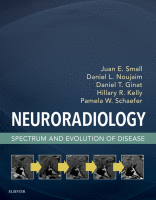Physical Address
304 North Cardinal St.
Dorchester Center, MA 02124

Introduction Paget's disease, or osteitis deformans, is a chronic metabolic disorder characterized by increased bone turnover and breakdown secondary to excessive and disorganized osteoclastic and osteoblastic activity ( Fig. 48.1 ). The precise etiology is still unclear. The excessive breakdown…

Introduction Otospongiosis, also known as otosclerosis, is a progressive primary bone disorder of abnormal bone resorption and deposition. The majority of cases result in a progressive conductive hearing loss with severe cases evolving to a combination of conductive and sensorineural…

Introduction Injection laryngoplasty is performed for treatment of vocal cord paralysis, which may have a variety of causes ( Box 46.1 ). Imaging during a Valsalva maneuver demonstrates the mechanical and physiologic barriers that patients with unilateral vocal cord paralysis…

Introduction Esthesioneuroblastoma (olfactory neuroblastoma) is an uncommon malignancy of the nasal cavity. Esthesioneuroblastoma represents 3% to 6% of sinonasal malignancies and has an estimated incidence of 0.4 cases per 1 million people. This tumor has been reported across a wide…

Introduction Paragangliomas of the head and neck are rare neoplasms of neural crest cell origin. The four most common sites for paragangliomas within the head and neck are at the carotid body, the jugular foramen, in the middle ear, and…

Introduction Labyrinthitis, also known as otitis interna, is an inflammatory disorder of the inner ear. Inflammation of the perilymphatic spaces results in secondary changes within the membranous labyrinth, the most common symptoms of which are sensorineural hearing loss and vertigo.…

Introduction A cholesteatoma is a cystic mass filled with keratin and lined by stratified squamous epithelium. Cholesteatoma is not a neoplasm and can be thought of most simply as skin in the wrong place. Although a cholesteatoma is histologically identical…

Introduction Sjögren syndrome (SS) is a chronic autoimmune disorder characterized by inflammatory destruction of the body's exocrine glands and may be considered primary or secondary, in association with other autoimmune disorders, such as collagen vascular diseases. Although SS can present…

Introduction Background IgG4-related disease (IgG4-RD) is a relatively recently recognized fibroinflammatory condition of unknown etiology characterized by elevated serum IgG4, plasmacytic infiltration, multifocal tumefactive fibrosis, and clinical improvement by steroid therapy. The association between autoimmune (sclerosing) pancreatitis and elevated serum…

Introduction Thyroid-associated orbitopathy (TAO), thyroid eye disease (TED), dysthyroid/TAO, and Graves orbitopathy all refer to a poorly understood autoimmune phenomenon resulting in the adipogenesis of orbital fat. An estimated 40% of patients with Graves disease develop TAO. Up to 20%…